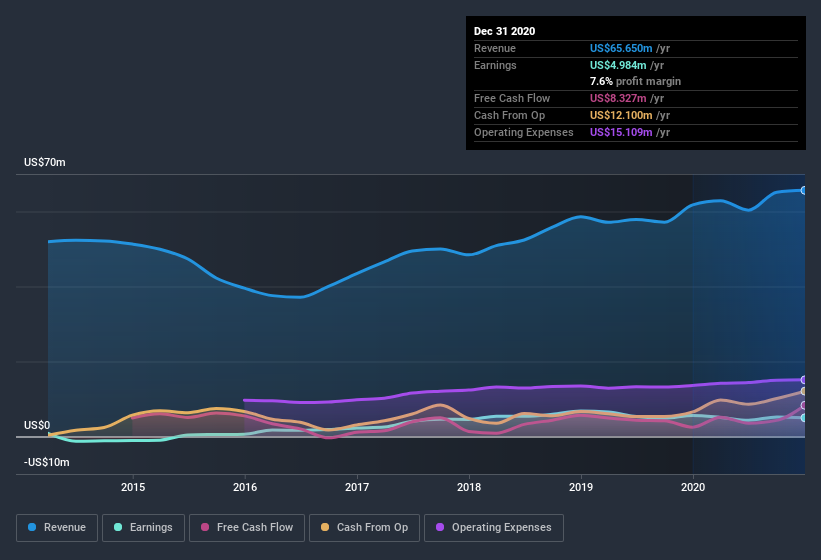- Singapore
- /
- Consumer Durables
- /
- SGX:BJZ
Should You Use Koda's (SGX:BJZ) Statutory Earnings To Analyse It?
Statistically speaking, it is less risky to invest in profitable companies than in unprofitable ones. That said, the current statutory profit is not always a good guide to a company's underlying profitability. In this article, we'll look at how useful this year's statutory profit is, when analysing Koda (SGX:BJZ).
While Koda was able to generate revenue of US$65.7m in the last twelve months, we think its profit result of US$4.98m was more important. In the chart below, you can see that its profit and revenue have both grown over the last three years, although its profit has slipped in the last twelve months.
See our latest analysis for Koda

Importantly, statutory profits are not always the best tool for understanding a company's true earnings power, so it's well worth examining profits in a little more detail. As a result, we think it's well worth considering what Koda's cashflow (when compared to its earnings) can tell us about the nature of its statutory profit. Note: we always recommend investors check balance sheet strength. Click here to be taken to our balance sheet analysis of Koda.
Zooming In On Koda's Earnings
In high finance, the key ratio used to measure how well a company converts reported profits into free cash flow (FCF) is the accrual ratio (from cashflow). The accrual ratio subtracts the FCF from the profit for a given period, and divides the result by the average operating assets of the company over that time. The ratio shows us how much a company's profit exceeds its FCF.
Therefore, it's actually considered a good thing when a company has a negative accrual ratio, but a bad thing if its accrual ratio is positive. That is not intended to imply we should worry about a positive accrual ratio, but it's worth noting where the accrual ratio is rather high. That's because some academic studies have suggested that high accruals ratios tend to lead to lower profit or less profit growth.
Koda has an accrual ratio of -0.12 for the year to December 2020. That indicates that its free cash flow was a fair bit more than its statutory profit. Indeed, in the last twelve months it reported free cash flow of US$8.3m, well over the US$4.98m it reported in profit. Koda's free cash flow improved over the last year, which is generally good to see.
Our Take On Koda's Profit Performance
Koda's accrual ratio is solid, and indicates strong free cash flow, as we discussed, above. Because of this, we think Koda's earnings potential is at least as good as it seems, and maybe even better! And on top of that, its earnings per share have grown at 8.9% per year over the last three years. At the end of the day, it's essential to consider more than just the factors above, if you want to understand the company properly. So while earnings quality is important, it's equally important to consider the risks facing Koda at this point in time. For example - Koda has 2 warning signs we think you should be aware of.
Today we've zoomed in on a single data point to better understand the nature of Koda's profit. But there is always more to discover if you are capable of focussing your mind on minutiae. Some people consider a high return on equity to be a good sign of a quality business. While it might take a little research on your behalf, you may find this free collection of companies boasting high return on equity, or this list of stocks that insiders are buying to be useful.
If you decide to trade Koda, use the lowest-cost* platform that is rated #1 Overall by Barron’s, Interactive Brokers. Trade stocks, options, futures, forex, bonds and funds on 135 markets, all from a single integrated account. Promoted
Valuation is complex, but we're here to simplify it.
Discover if Koda might be undervalued or overvalued with our detailed analysis, featuring fair value estimates, potential risks, dividends, insider trades, and its financial condition.
Access Free AnalysisThis article by Simply Wall St is general in nature. It does not constitute a recommendation to buy or sell any stock, and does not take account of your objectives, or your financial situation. We aim to bring you long-term focused analysis driven by fundamental data. Note that our analysis may not factor in the latest price-sensitive company announcements or qualitative material. Simply Wall St has no position in any stocks mentioned.
*Interactive Brokers Rated Lowest Cost Broker by StockBrokers.com Annual Online Review 2020
Have feedback on this article? Concerned about the content? Get in touch with us directly. Alternatively, email editorial-team (at) simplywallst.com.
About SGX:BJZ
Koda
Designs, manufactures, sells, and export wood furniture and fixtures in the Asia-Pacific, North America, Europe, and internationally.
Adequate balance sheet with low risk.
Market Insights
Community Narratives


